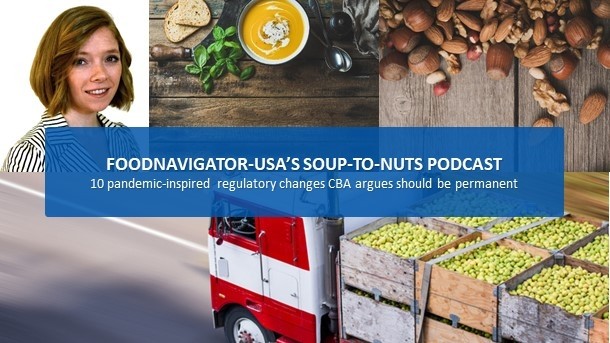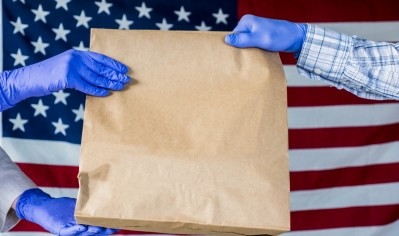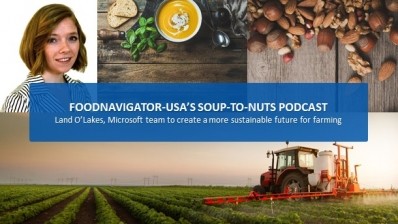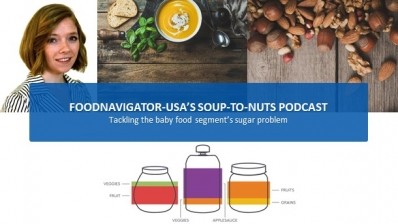Soup-To-Nuts Podcast: 10 pandemic-inspired regulatory changes the Consumer Brands Association wants made permanent

The trade group argues many of these changes have helped to keep delivery trucks running, modernized inspections and audit models, established new best practices, added labeling flexibility and streamlined manufacturing among other benefits.
Not wanting these improvements or other lessons learned from the outbreak to go to waste when the threat of the virus eases and the country returns to “a more conventional regulatory environment,” the trade group argues that 10 of the polices amended during pandemic should be made permanent.
In this episode of FoodNavigator-USA’s Soup-to-Nuts podcast, CBA executive vice president of public affairs Brian Zumwalt discusses how these reforms help safely keep food on store shelves and in shoppers’ pantries, why they should be made permanent and what industry can expect going forward.
[Editor’s note: Never miss another episode of FoodNavigator-USA’s Soup-To-Nuts Podcast. Subscribe on iTunes.]
Getting from there to here: improvements in transportation
One area where CBA sees significant improvement and potential is around transportation. Already strained before the outbreak, transportation demands during the pandemic intensified to the point where produce was rotting in fields and products were stuck at warehouses waiting for trucks while some grocery shelves were bare.
In response, Zumwalt lauded the government for easing the ‘Hours of Service’ rules, something he says the trade group has long lobbied for, and essentially creating a nationwide pilot to test the safe operation of heavier trucks on US highways.
“Allowing the additional flexibility for truck drivers, whether it’s increasing driving time, expanding the driving hours during adverse conditions, adjusting break times and dwell times. What it did was open up additional levels of flexibility that truck drivers did not have pre-COVID-19 and it allowed for additional support,” so drivers could move more goods and services, he said.
He added that the changes have not revealed any safety issues and as such CBA is very pleased that the Federal Motor Carrier Safety Administration decided to make those changes permanent.
The other change to transportation may be harder to make permanent, Zumwalt acknowledged, but by temporarily allowing states to decide safe truck weight limits for the roads the government has created “what essentially turned out to be a pilot program where we’re going to have an honest sense of how the allowance of additional truck weight provides support and ability to move products and goods around the country more efficiently and sustainably,” he said.
Modernizing audits & improving response time
The need to maintain social distance during the pandemic also posed significant challenges to routine inspections and third-party audits, but Zumwalt said it also revealed alternative approaches to replace in-person practices that could save companies time and resources.
One example is FDA’s recent two-tiered pilot inspection program for food manufacturers, which Zumwalt said allows for less interpersonal interaction to provide the same level of inspections necessary to ensure food products and food safety can be delivered to consumers.
The urgency created by the pandemic also revealed regulators’ ability to more quickly respond to stakeholders questions – a process that Zumwalt said historically can take a weeks to clear common questions for the general public but which happened much faster during the early days of the outbreak.
Zumwalt explained that CBA hopes going forward to expand the government’s capability to provide ‘speed of business’ regulatory responses to stakeholders. He added the trade group also would like to see expedited creation of ‘just-in-time’ best practice documents.
Labeling disclosures eased
To help ease supply pressure at the retail level once restaurants and food service providers were no longer operational, the government temporarily eased some labeling requirements at the retail level to allow for sale of bulk items or repackaged food previously destined for food service.
For example, FDA allowed restaurants to sell packaged food without Nutrition Facts labeling direct to consumers with the recognition that many manufacturers had more product than packaging. FDA made a similar allowance for shell eggs sold in bulk to restaurants to be divvied up to consumers.
CBA argues that flexibility that allows food streams to be redirected as needed should be maintained to avoid “orphaned products,” but Zumwalt acknowledged this will be an area where there likely will be the most lessons learned.
Another labeling change that CBA would like to see post-COVID-19 is expanded digital disclosure of production information, which Zumwalt says is essential now that so many consumers are shopping for food online.
‘Switch and notify’ adds flexibility without compromising safety
Finally, CBA would like regulators to adopt a “switch and notify” approach to supplier changes to avoid disruption in production and delivery of high-demand commodity ingredients and products.
Zumwalt explained that prior to COVID-19 EPA required manufacturers of certain products to stop lines and request advance approval when changing suppliers of inert or active product ingredients. But during the COVID-19 crisis EPA moved to a switch and notify policy for manufacturers changing suppliers of select commodity ingredients so that production could continue and shortages could be avoided.
Zumwalt acknowledges that not everything on CBA’s wish list will be easy or quickly implemented, but he said the trade group hopes that momentum, good will and open lines of communication created during the pandemic will help carry conversations and change forward. Until then, he praised the industry for its innovation, endurance and ability to supply the products that consumers need every day.









